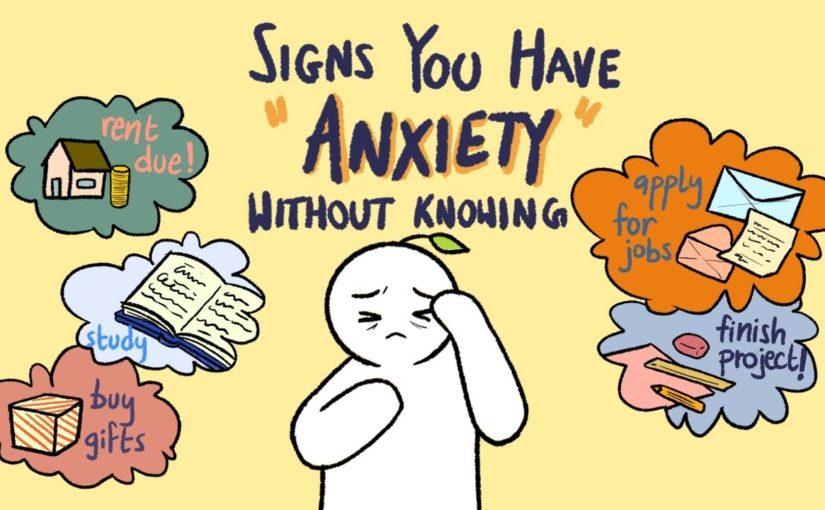
A Declassified Guide to Anxiety
People, with generalized anxiety disorder or, GAD are characterized by constant stress or excessive anxiety When something stressful happens. The brain releases cortisol and adrenaline. This causes the muscles to prepare to fight off the stressor or run away from it, This is otherwise known as a sympathetic nervous system response or the fight or flight reflex. People with GAD have fight or flight constantly running on the back burner. Each of the following points is a result of that reflex, Restlessness and fidgeting. This is more the flight than the fight response. The muscles and brain are ready to go, but there’s nothing to run from. This is why doctors say that regular exercise alleviates symptoms of anxiety because people are using all their pent-up go hormones in their bodies to go. Some people find it helpful to have a small object to occupy their hands like a scrap of paper to fold and tear This way. The hands are kept busy and prevented from harmful fidgeting habits like chewing or picking at their fingers. Lack of energy or rapid fatigue. The flip side of your body constantly being ready to run or fight is that it’s truly exhausting. For example, if you were to tense every muscle possible in your body right now and hold it for the rest of forever, you’d get exhausted. Pretty quick When all your energy is going toward something that could require an immediate response, then everyday tasks like getting up to turn off the lights seem much more: tiring, Irritable, bowels, acid, reflux, nausea, or other stomach ailments. The first thought is probably 39, but if you think about it, this makes a lot of sense. People can’t run long distances or perform heavy workouts with a full stomach or that leads to cramps. So this is your body attempting to rush the job of digestion so that it can allow for a fight and make your body lighter and more aerodynamic, which makes fleeing easier Trouble, falling asleep, or staying asleep. This one is pretty simple: If you’re in one place for too long, the danger could catch up to you, Your body, however, doesn’t realize that there isn’t any danger. So if you stay awake or only sleep short periods, it’s safer. Unfortunately, this system is a nasty cycle. You get anxious, so you can’t sleep, which leads to even more stress on your mind and body which makes it even harder to sleep, and so on. In Hyperventilation Muscle processing, more energy requires more oxygen to keep up the exertion, So breathing quickly would help to maximize oxygen intake. The challenge occurs when we overexert this response and the lungs don’t have time to pull the oxygen out of the air we breathe before. We exhale That’s when oxygen intake decreases and results in that dizzy sensation. Many people experience during a panic attack, Heart palpitations, Similar to the hyperventilation symptom heart palpitations happen because the body uses blood to carry oxygen to the muscles To carry the most oxygen fastest to hardworking muscles. The heart has to pump it faster, resulting in palpitations, Clenched jaw, or teeth grinding. Your body is ready for action. However, the challenge with anxiety disorders is not knowing what action. So your body responds with tensed muscles like a clenched jaw and teeth grinding Other common muscles. Tension responses could be clenched, fists, curled toes tension, headache or chronic migrained neck, or shoulder pain Shaking hands. This is another sign that adrenaline is sending your body signals to go in a situation when you don’t want to go anywhere. This can also be a by-product of tension due to overexertion of the muscles Sweating. Sweat is our body’s way of cooling off during intense energy. Exertion Muscles are burning energy being tensed and ready to go to work which is generating heat. So the body moderates its temperature by sweating, even when you feel cold, Hot, and cold sensations. The fight or flight response excites the body which causes increased energy flows and creates heat. If the heat generated is intense enough, the body’s parasympathetic nervous system is triggered, which creates a relaxation response. However, the body also sweats to cool itself. When heat is generated, Coupled with the sudden relaxation courtesy of the parasympathetic system, the body can experience chills because it cools too fast and is not used to the lower core temperature Anxiety is a state of constant fear due to stressors from your body. This fear was a logical response for a prehistoric human who needed to run or scare away predators when in danger, but it can be distracting in today,’ fast-paced world. The silver lining, though, is that people with anxiety are the ones most prepared to survive the zombie apocalypse. Do you or someone around you suffer from these symptoms of anxiety? If so, do you have any helpful tips on how to deal with them Be sure to let us know in the comment section below If you enjoyed this video, please be sure to follow our social media for more psychology content, and don’t forget to subscribe. Thank you for watching and have a wonderful day.Anxiety disorders are a group of mental disorders characterized by significant feelings of anxiety and fear. Anxiety is a worry about future events and fear is a reaction to current events. These feelings may cause physical symptoms, such as a fast heart rate and shakiness. 5 Exercise to understand your anxiety better: http://psych2go.net/psychology-exerci… Get a fidget cube here: https://www.introvertpalace.com/produ… These are high quality and have a good refund policy. ᵛᶦᵈᵗᵒᵒⁿ™ ².¹ ᴏɴᴇ ᴛɪᴍᴇ ᴏꜰꜰᴇʀ – ᴛʜᴇ 2ᴅ ᴀᴍɪɴᴀᴛɪᴏɴ ᴠɪᴅᴇᴏ ᴍᴀᴋᴇʀ After The Massive Success Of VidToon™ 1.0
And More Than 10ᴋ Happy Customers…WE ARE BACK ON Popular Demand! Redefine Profitability With The World’s Easiest & Most Popular Video Animation Software It’s ʙɪɢɢᴇʀ. ʙᴇᴛᴛᴇʀ. ᴀɴᴅ ꜰᴀꜱᴛᴇʀ.

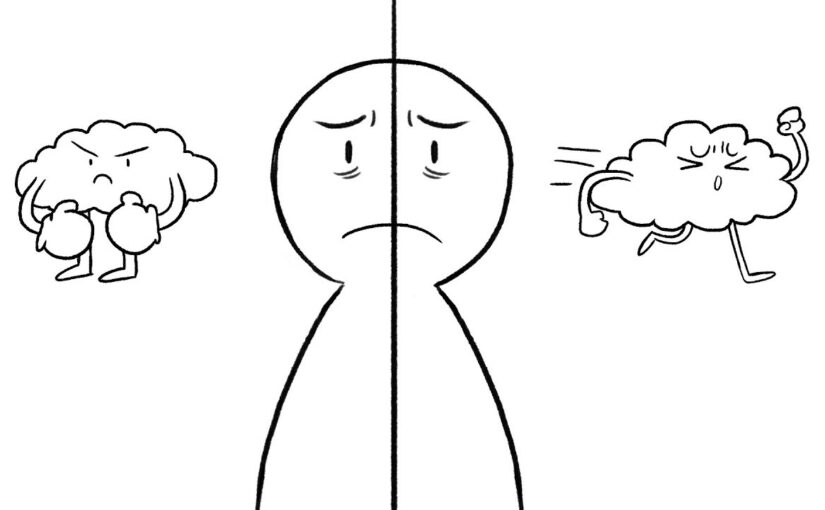
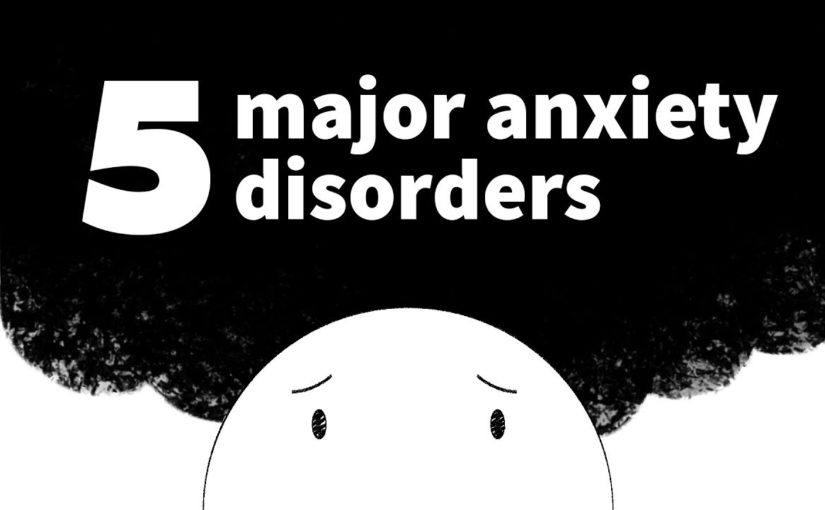
 Social anxiety is mainly treated with SSRIs and therapy, As we stated before, just because a treatment option looks similar from one anxiety to another. It isn’t going to be the same. Each sufferer presents their own needs that must be taken into account. Each therapy isn’t going to work the same for each Personalization of treatment is key in these situations. Number four panic disorder. Unlike the other anxiety disorders on this list, panic disorder rests solely on panic attacks With many other anxiety disorders. Panic attacks are just another symptom when it comes to panic disorder. Those attacks are the symptom. Panic disorder is characterized by recurrent panic attacks. The sufferer may experience heart palpitations erasing pulse an intense fear and the feeling that they are hopelessly out of control There. There isn’t a rhyme or reason to many of these attacks, so the sufferer is essentially lying in wait for the next one to come, Panic disorder can be treated in many ways. The medications used are some that we’ve heard of such as benzodiazepines and SSRIs. We are also introduced to serotonin-norepinephrine, reuptake, inhibitors or SNRIs, and beta blockers. These medications, as with OCD, are often used in conjunction with therapy to help maximize the usefulness of each Number. 5 post, traumatic, stress, disorder, Post, traumatic, stress, disorder or PTSD can be diagnosed in anyone For the most part. You have probably heard it when someone speaks about veterans or police officers, While those careers have a higher rate of PTSD. It is in fact, true that anyone can be diagnosed with it. Ptsd is the result of a very traumatic event or series of events. This leaves the sufferer with flashbacks and night terrors, where they feel as if they are right back in the event again, The sufferer may also suffer from panic attacks, as well as phobias, associated with people places or even sounds Medications such as fluoxetine venlafaxine may be used In the treatment of PTSD Therapies such as prolonged exposure, cognitive processing therapy, and brief eclectic psychotherapy may be utilized as well Again. This is a situation where the use of medications and therapy together can help give a better outcome than just one alone. It is important to note that those with PTSD can lash out in certain situations, But there is no need to be afraid of the sufferers. There is nothing inherently dangerous about them. Those with mental illness are exponentially more likely to be the victims of violent crimes than they are to be the perpetrators. This is not a complete list of the different anxiety disorders out there by any means, nor is it completely comprehensive in each description. There are many kinds of anxiety these just happen to be the most talked about and diagnosed at this particular moment, Regardless of which anxiety disorder. The diagnosis, it is important to remember that the sufferer needs help and acceptance. You don’t have to understand anxiety to be able to offer an ear to talk to, or some words to keep them grounded in the moment Remind the sufferer that they are alright, that what they are feeling are just symptoms of their anxiety, and that it Will pass if, given the time Aside from that, just make sure that they know you are there with them and wait it out? Do you suffer from one or more of the disorders listed Share your story in the comments below On a different note. Psych2Go is now selling t-shirts Links will be in the description below, As always, don’t forget to subscribe, and thanks for watching.
Social anxiety is mainly treated with SSRIs and therapy, As we stated before, just because a treatment option looks similar from one anxiety to another. It isn’t going to be the same. Each sufferer presents their own needs that must be taken into account. Each therapy isn’t going to work the same for each Personalization of treatment is key in these situations. Number four panic disorder. Unlike the other anxiety disorders on this list, panic disorder rests solely on panic attacks With many other anxiety disorders. Panic attacks are just another symptom when it comes to panic disorder. Those attacks are the symptom. Panic disorder is characterized by recurrent panic attacks. The sufferer may experience heart palpitations erasing pulse an intense fear and the feeling that they are hopelessly out of control There. There isn’t a rhyme or reason to many of these attacks, so the sufferer is essentially lying in wait for the next one to come, Panic disorder can be treated in many ways. The medications used are some that we’ve heard of such as benzodiazepines and SSRIs. We are also introduced to serotonin-norepinephrine, reuptake, inhibitors or SNRIs, and beta blockers. These medications, as with OCD, are often used in conjunction with therapy to help maximize the usefulness of each Number. 5 post, traumatic, stress, disorder, Post, traumatic, stress, disorder or PTSD can be diagnosed in anyone For the most part. You have probably heard it when someone speaks about veterans or police officers, While those careers have a higher rate of PTSD. It is in fact, true that anyone can be diagnosed with it. Ptsd is the result of a very traumatic event or series of events. This leaves the sufferer with flashbacks and night terrors, where they feel as if they are right back in the event again, The sufferer may also suffer from panic attacks, as well as phobias, associated with people places or even sounds Medications such as fluoxetine venlafaxine may be used In the treatment of PTSD Therapies such as prolonged exposure, cognitive processing therapy, and brief eclectic psychotherapy may be utilized as well Again. This is a situation where the use of medications and therapy together can help give a better outcome than just one alone. It is important to note that those with PTSD can lash out in certain situations, But there is no need to be afraid of the sufferers. There is nothing inherently dangerous about them. Those with mental illness are exponentially more likely to be the victims of violent crimes than they are to be the perpetrators. This is not a complete list of the different anxiety disorders out there by any means, nor is it completely comprehensive in each description. There are many kinds of anxiety these just happen to be the most talked about and diagnosed at this particular moment, Regardless of which anxiety disorder. The diagnosis, it is important to remember that the sufferer needs help and acceptance. You don’t have to understand anxiety to be able to offer an ear to talk to, or some words to keep them grounded in the moment Remind the sufferer that they are alright, that what they are feeling are just symptoms of their anxiety, and that it Will pass if, given the time Aside from that, just make sure that they know you are there with them and wait it out? Do you suffer from one or more of the disorders listed Share your story in the comments below On a different note. Psych2Go is now selling t-shirts Links will be in the description below, As always, don’t forget to subscribe, and thanks for watching.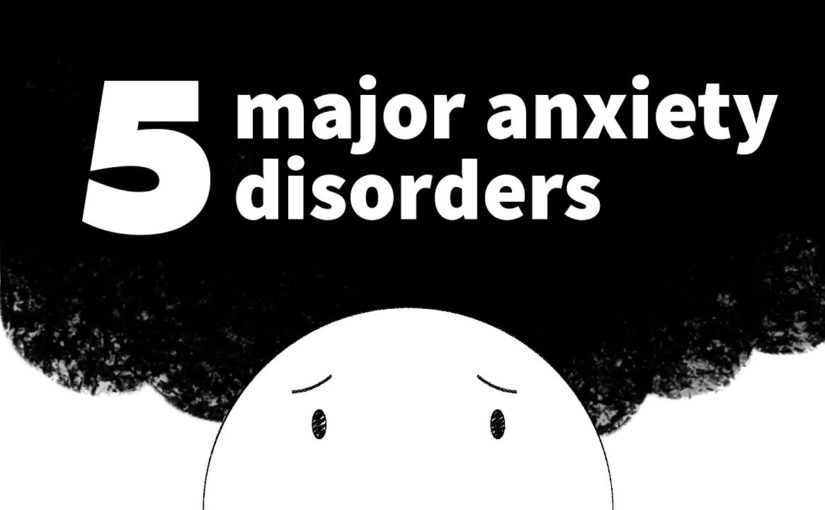




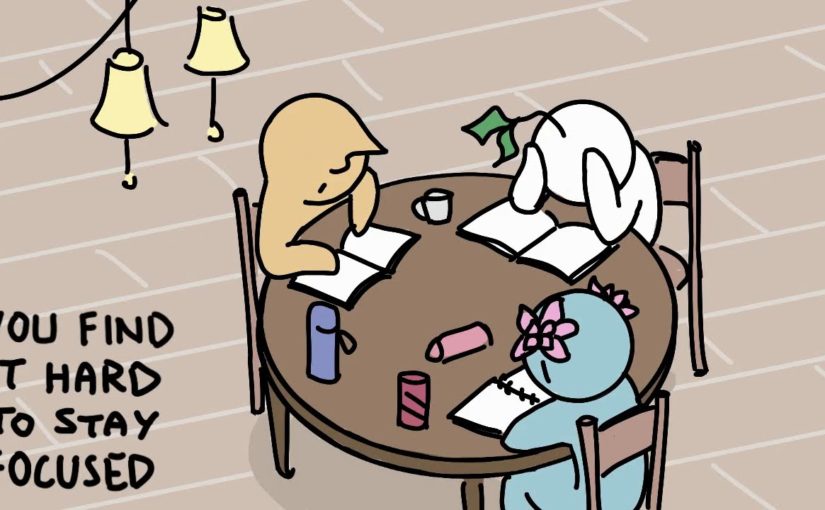


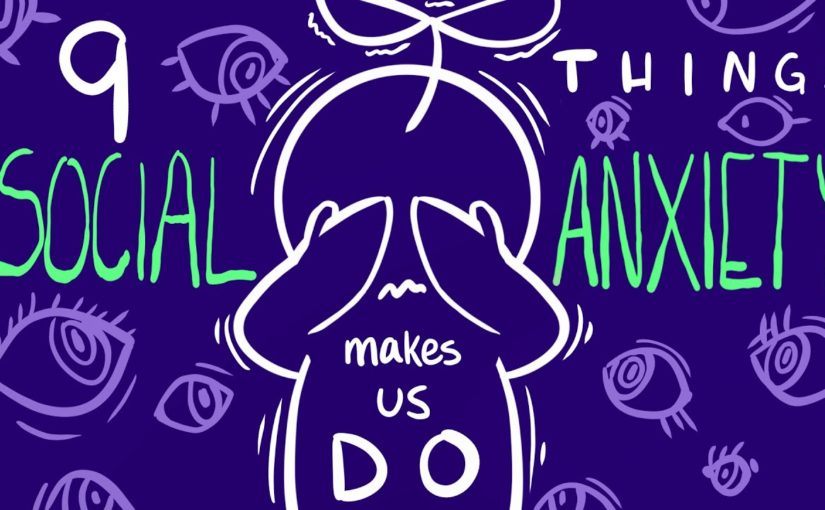
 It can be a lot easier to act busy rather than face the awkwardness of an unwanted conversation. So, this can become a habit of avoidance. If you have social anxiety, five constantly worrying about how everyone sees you. According to the Anxiety and Depression Association of America, those with a social anxiety disorder are increasingly concerned about how they are perceived by others. The last thing they want is to come off as awkward, fumbling, or boring. You’ve likely felt this way at some point throughout your life, whether it’s the desire to fit in with friends or make a good impression on a potential employer with social anxiety. However, this pressure to perform feels constantly heavy and can lead to full-blown panic attacks when in social or performance-based situations Number six is feeling lonely. Even when you’re surrounded by people, People with social anxiety can share this feeling with those who battle, depression and other mental illnesses as well. So, unfortunately, a lot of people can relate to this isolating feeling When social anxiety keeps you from being your true self. It can be difficult to feel included at all. It’s frustrating to be close to others, but not be able to connect with them in a comfortable way. If you’re struggling to effectively communicate and are extremely hesitant to even start a conversation that adds to your feelings of loneliness, even when you’re, surrounded by others, Number seven clenching your teeth and other physical discomforts, you feel shaky or lightheaded when faced with A social situation: Does your heart rate speed up or do your hands tremble? The stress that comes with social anxiety can manifest through physical symptoms. Many of the symptoms are signs of nervousness such as sweating, flushing, and feeling shaky According to Mayo Clinic. You might also be dealing with muscle tension, feeling that your mind has gone blank, or having trouble catching your breath. Number eight obsessing over how you look When you’re, constantly worried about how others perceive you. You’re likely to be concerned with how you look as well. You might have a distorted body image and think that you’re less physically attractive. Your thoughts can flit from your hair to your clothes or flaws in your skin. Thinking that it’s just all wrong In an attempt to feel comfortable in your own skin, you might spend an inappropriate amount of time and money on fixing your appearance, such as shopping for better clothes, getting high-end beauty products, or going on diets. If you think you’re overweight and number nine, you feel more like yourself around the people. You’re comfortable with Yourself, think you’re picky about who you spend time with, and triumph over shyness by conquering social anxiety disorder, Dr. Marie B. Stein and John R. Walker discusses behavior in children called selective mutism. This is when a child speaks and acts normally around select individuals but is completely silent around everyone else or when placed in certain situations. This is a more extreme example, but it shows how those with social anxiety are more likely to relax and open up around people. They already know and trust, do you or anyone you know resonate with any of these points mentioned in this video? If you’re concerned about social anxiety disorder, we encourage you to speak with a mental health professional. They can help you overcome any fears or debilitating problems you might have If you enjoyed watching this video, give us a thumbs up and share it with someone who might find it helpful as well. The studies and references used in this video are listed in the description below Don’t forget to hit the subscribe button for more Psych2go videos and as always thanks for watching and we’ll see you next time.
It can be a lot easier to act busy rather than face the awkwardness of an unwanted conversation. So, this can become a habit of avoidance. If you have social anxiety, five constantly worrying about how everyone sees you. According to the Anxiety and Depression Association of America, those with a social anxiety disorder are increasingly concerned about how they are perceived by others. The last thing they want is to come off as awkward, fumbling, or boring. You’ve likely felt this way at some point throughout your life, whether it’s the desire to fit in with friends or make a good impression on a potential employer with social anxiety. However, this pressure to perform feels constantly heavy and can lead to full-blown panic attacks when in social or performance-based situations Number six is feeling lonely. Even when you’re surrounded by people, People with social anxiety can share this feeling with those who battle, depression and other mental illnesses as well. So, unfortunately, a lot of people can relate to this isolating feeling When social anxiety keeps you from being your true self. It can be difficult to feel included at all. It’s frustrating to be close to others, but not be able to connect with them in a comfortable way. If you’re struggling to effectively communicate and are extremely hesitant to even start a conversation that adds to your feelings of loneliness, even when you’re, surrounded by others, Number seven clenching your teeth and other physical discomforts, you feel shaky or lightheaded when faced with A social situation: Does your heart rate speed up or do your hands tremble? The stress that comes with social anxiety can manifest through physical symptoms. Many of the symptoms are signs of nervousness such as sweating, flushing, and feeling shaky According to Mayo Clinic. You might also be dealing with muscle tension, feeling that your mind has gone blank, or having trouble catching your breath. Number eight obsessing over how you look When you’re, constantly worried about how others perceive you. You’re likely to be concerned with how you look as well. You might have a distorted body image and think that you’re less physically attractive. Your thoughts can flit from your hair to your clothes or flaws in your skin. Thinking that it’s just all wrong In an attempt to feel comfortable in your own skin, you might spend an inappropriate amount of time and money on fixing your appearance, such as shopping for better clothes, getting high-end beauty products, or going on diets. If you think you’re overweight and number nine, you feel more like yourself around the people. You’re comfortable with Yourself, think you’re picky about who you spend time with, and triumph over shyness by conquering social anxiety disorder, Dr. Marie B. Stein and John R. Walker discusses behavior in children called selective mutism. This is when a child speaks and acts normally around select individuals but is completely silent around everyone else or when placed in certain situations. This is a more extreme example, but it shows how those with social anxiety are more likely to relax and open up around people. They already know and trust, do you or anyone you know resonate with any of these points mentioned in this video? If you’re concerned about social anxiety disorder, we encourage you to speak with a mental health professional. They can help you overcome any fears or debilitating problems you might have If you enjoyed watching this video, give us a thumbs up and share it with someone who might find it helpful as well. The studies and references used in this video are listed in the description below Don’t forget to hit the subscribe button for more Psych2go videos and as always thanks for watching and we’ll see you next time.
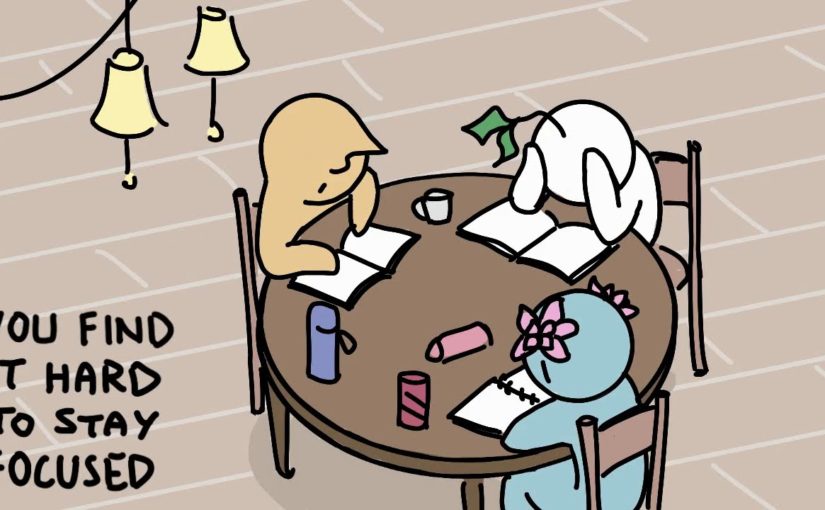
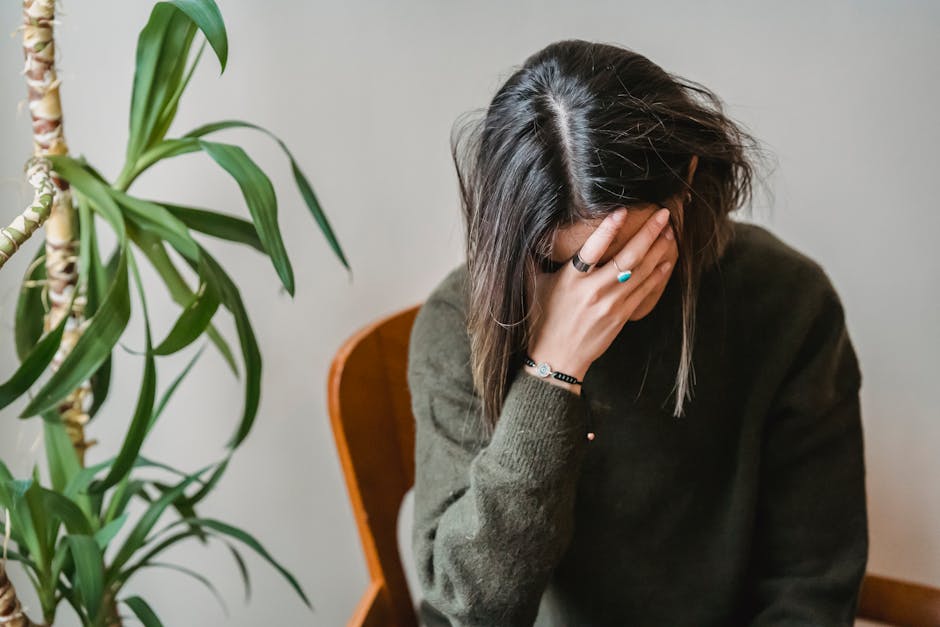 Is one more likely than
the other to take place? Number four, you have no clue if others can sense your anxiety. Do you worry about whether
Or can no other people tell when you’re feeling anxious? And then are you doubly
worried about how someone will react if they do find out
you’re having a panic attack? Since no people experience
anxiety the same way nor are any two situations the same, there’s no tangible way to tell
unless you tell someone that you’re not feeling well. If anything, your anxiety
is not as noticeable as you fear it to be. There are so many other restless, sweaty, awkward people in the world and everyone else is probably
too worried about themselves that they’re less likely to notice if you look a little
flushed or acted a little odd. Five, you can literally
worry yourself sick. Have you ever been so stressed
and worried that you felt like you might throw up or pass out? When you suffer from anxiety,
These severe reactions become normal which can put immense stress on your body over time. Mayo Clinic states that
symptoms such as headaches, heart palpitations, and
Gastrointestinal issues are common expressions of anxiety. Dealing with these over
an extended period of time can lead to complications such
as irritable bowel syndrome and other chronic disruptions
in the nervous system. Six, self-doubt slows you down socially. Do you long to be out and
about with your friends but your anxiety and doubt convince you to stay home instead? Socializing can be incredibly stressful for someone with anxiety, especially if you have
social anxiety disorder which is specific to
public or group settings. Between physical symptoms
and a racing mind, keeping up a conversation with
your friends can be tricky. Your brain interrupts with
intrusive thoughts and questions and you wonder if you’re doing it right. If you notice that you’re worrying about whether your anxiety makes
you come across as awkward or quiet, that’s okay. It’s good to be aware
of your effect on others but make sure you’re trying your best to be genuine and be you. Living in today’s society is
a lot of pressure already, so there’s no need to
double down on yourself. Seven, you find it hard to stay focused, you find
It is hard to stay focused. When your anxiety is bad, do
you struggle to concentrate? Like, when you must
reread a page in a book a couple of times over before you finally comprehend what you’re reading. Recent BBC research cites a 2011 study from the University of Notre Dame, which confirms that the
brain is designed to hold only so much information at once. If you’re taking up that
space with tons of what-ifs and worries, there won’t be much room left for anything else. Changing your thought patterns
won’t happen overnight but it’s certainly possible. It will likely take some trial and error to find what works for you
but practicing mindfulness, getting exercise, and avoiding multitasking are a few good places to start. And number eight, yes, you can have anxiety
about your anxiety. Have you ever heard of agoraphobia? The UK National Health
Service defines agoraphobia as a fear of being in
situations where escape might be difficult or that
help wouldn’t be available if things go wrong. Most people who suffer from this condition practice avoidance. Some might refuse to take
public transportation or be in crowded or open spaces, while others may not
leave their house at all. Avoidance aims to protect you from danger, panic, and even embarrassment. Did you relate to any of these scenarios? Tell us about it in the comments below. Anxiety is tough but so are you. If you have any other tips that
help you with your anxiety, share them in the comments below. If you found this video
helpful, please like and share this video with someone who can benefit from it too. The studies and references used are listed in the description below. Don’t forget to hit the subscribe button and the notification bell icon
for more psych2 go videos. Thank you for watching and
We’ll see you next time.
Is one more likely than
the other to take place? Number four, you have no clue if others can sense your anxiety. Do you worry about whether
Or can no other people tell when you’re feeling anxious? And then are you doubly
worried about how someone will react if they do find out
you’re having a panic attack? Since no people experience
anxiety the same way nor are any two situations the same, there’s no tangible way to tell
unless you tell someone that you’re not feeling well. If anything, your anxiety
is not as noticeable as you fear it to be. There are so many other restless, sweaty, awkward people in the world and everyone else is probably
too worried about themselves that they’re less likely to notice if you look a little
flushed or acted a little odd. Five, you can literally
worry yourself sick. Have you ever been so stressed
and worried that you felt like you might throw up or pass out? When you suffer from anxiety,
These severe reactions become normal which can put immense stress on your body over time. Mayo Clinic states that
symptoms such as headaches, heart palpitations, and
Gastrointestinal issues are common expressions of anxiety. Dealing with these over
an extended period of time can lead to complications such
as irritable bowel syndrome and other chronic disruptions
in the nervous system. Six, self-doubt slows you down socially. Do you long to be out and
about with your friends but your anxiety and doubt convince you to stay home instead? Socializing can be incredibly stressful for someone with anxiety, especially if you have
social anxiety disorder which is specific to
public or group settings. Between physical symptoms
and a racing mind, keeping up a conversation with
your friends can be tricky. Your brain interrupts with
intrusive thoughts and questions and you wonder if you’re doing it right. If you notice that you’re worrying about whether your anxiety makes
you come across as awkward or quiet, that’s okay. It’s good to be aware
of your effect on others but make sure you’re trying your best to be genuine and be you. Living in today’s society is
a lot of pressure already, so there’s no need to
double down on yourself. Seven, you find it hard to stay focused, you find
It is hard to stay focused. When your anxiety is bad, do
you struggle to concentrate? Like, when you must
reread a page in a book a couple of times over before you finally comprehend what you’re reading. Recent BBC research cites a 2011 study from the University of Notre Dame, which confirms that the
brain is designed to hold only so much information at once. If you’re taking up that
space with tons of what-ifs and worries, there won’t be much room left for anything else. Changing your thought patterns
won’t happen overnight but it’s certainly possible. It will likely take some trial and error to find what works for you
but practicing mindfulness, getting exercise, and avoiding multitasking are a few good places to start. And number eight, yes, you can have anxiety
about your anxiety. Have you ever heard of agoraphobia? The UK National Health
Service defines agoraphobia as a fear of being in
situations where escape might be difficult or that
help wouldn’t be available if things go wrong. Most people who suffer from this condition practice avoidance. Some might refuse to take
public transportation or be in crowded or open spaces, while others may not
leave their house at all. Avoidance aims to protect you from danger, panic, and even embarrassment. Did you relate to any of these scenarios? Tell us about it in the comments below. Anxiety is tough but so are you. If you have any other tips that
help you with your anxiety, share them in the comments below. If you found this video
helpful, please like and share this video with someone who can benefit from it too. The studies and references used are listed in the description below. Don’t forget to hit the subscribe button and the notification bell icon
for more psych2 go videos. Thank you for watching and
We’ll see you next time.
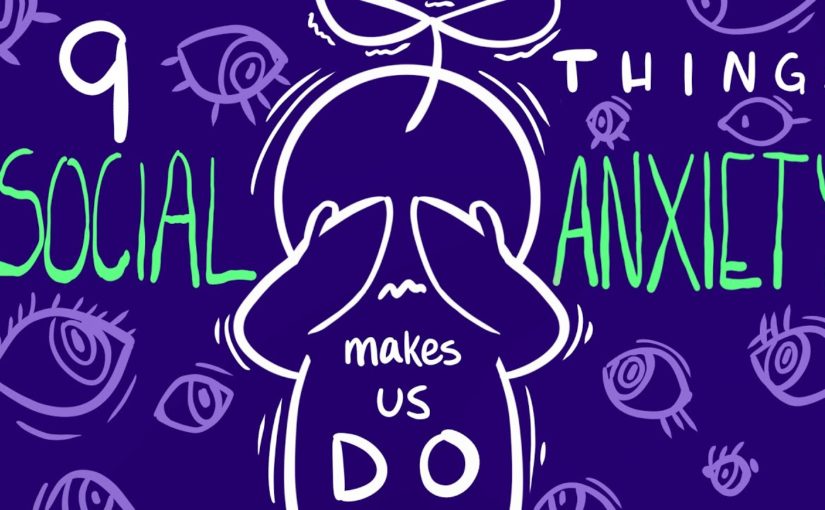
 The last thing they want
is to come off as awkward, fumbling, or boring. You’ve likely felt this way at some point throughout your life, whether it’s the desire
to fit in with friends or make a good impression
on a potential employer, with social anxiety however, this pressure to perform
feels constantly heavy and can lead to full-blown panic attacks when in social or
performance-based situations. Number six is feeling lonely, even when you’re surrounded by people. People with social anxiety
can share this feeling with those who battle depression and other mental illnesses as well. So, unfortunately, a lot
of people can relate to this isolating feeling. When social anxiety keeps you
from being your true self, it can be difficult to
feel included at all. It’s frustrating to be close to others, but not be able to connect
with them comfortably. If you’re struggling
to properly communicate and are extremely hesitant
to even start a conversation, that adds to your feelings of loneliness, even when you’re surrounded by others. Number seven, clenching your teeth and other physical discomforts. You feel shaky or lightheaded when faced with a social situation. Does your heart rate speed
up, or do your hands tremble? The stress that comes with social anxiety can manifest through physical symptoms. Many of the symptoms are
signs of nervousness, such as sweating, flushing,
and feeling shaky. According to the Mayo Clinic, you might also be dealing
with muscle tension, feeling that your mind has gone blank, or having trouble catching your breath. Number eight, obsessing over how you look. When you’re constantly worried about how others perceive you, you’re likely to be concerned
with how you look as well. You might have a distorted body image and think that you’re less
physically attractive. Your thoughts can flit from
your hair to your clothes or flaws in your skin, thinking
that it’s just all wrong. In an attempt to feel
comfortable in your skin, you might spend an inappropriate
amount of time and money on fixing your appearance, such as shopping for better clothes, getting high-end beauty
products, or going on diets if you think you’re overweight. And number nine, you
feel more like yourself around the people you’re comfortable with. You think you’re picky about
who you spend time with and triumph over shyness, conquering social anxiety disorder, Dr. Marie B. Stein and John R. Walker discuss behavior in children
called selective mutism. This is when a child
speaks and acts normally around select individuals,
but is completely silent around everyone else, or when
placed in certain situations, this is a more extreme example, but it shows how those with social anxiety are more likely to relax and open up around people they already know and trust. Do you or anyone you know resonate with any of these points
mentioned in this video? If you’re concerned about
social anxiety disorder, we encourage you to speak with
a mental health professional, they can help you overcome any fears or debilitating problems you might have. If you enjoyed watching this
video, give us a thumbs up and share it with someone who
might find it helpful as well. The studies and references
used in this video are listed in the description below. Don’t forget to hit the subscribe button for more Psych2go videos and as always, thanks for watching, and we’ll see you next time.
The last thing they want
is to come off as awkward, fumbling, or boring. You’ve likely felt this way at some point throughout your life, whether it’s the desire
to fit in with friends or make a good impression
on a potential employer, with social anxiety however, this pressure to perform
feels constantly heavy and can lead to full-blown panic attacks when in social or
performance-based situations. Number six is feeling lonely, even when you’re surrounded by people. People with social anxiety
can share this feeling with those who battle depression and other mental illnesses as well. So, unfortunately, a lot
of people can relate to this isolating feeling. When social anxiety keeps you
from being your true self, it can be difficult to
feel included at all. It’s frustrating to be close to others, but not be able to connect
with them comfortably. If you’re struggling
to properly communicate and are extremely hesitant
to even start a conversation, that adds to your feelings of loneliness, even when you’re surrounded by others. Number seven, clenching your teeth and other physical discomforts. You feel shaky or lightheaded when faced with a social situation. Does your heart rate speed
up, or do your hands tremble? The stress that comes with social anxiety can manifest through physical symptoms. Many of the symptoms are
signs of nervousness, such as sweating, flushing,
and feeling shaky. According to the Mayo Clinic, you might also be dealing
with muscle tension, feeling that your mind has gone blank, or having trouble catching your breath. Number eight, obsessing over how you look. When you’re constantly worried about how others perceive you, you’re likely to be concerned
with how you look as well. You might have a distorted body image and think that you’re less
physically attractive. Your thoughts can flit from
your hair to your clothes or flaws in your skin, thinking
that it’s just all wrong. In an attempt to feel
comfortable in your skin, you might spend an inappropriate
amount of time and money on fixing your appearance, such as shopping for better clothes, getting high-end beauty
products, or going on diets if you think you’re overweight. And number nine, you
feel more like yourself around the people you’re comfortable with. You think you’re picky about
who you spend time with and triumph over shyness, conquering social anxiety disorder, Dr. Marie B. Stein and John R. Walker discuss behavior in children
called selective mutism. This is when a child
speaks and acts normally around select individuals,
but is completely silent around everyone else, or when
placed in certain situations, this is a more extreme example, but it shows how those with social anxiety are more likely to relax and open up around people they already know and trust. Do you or anyone you know resonate with any of these points
mentioned in this video? If you’re concerned about
social anxiety disorder, we encourage you to speak with
a mental health professional, they can help you overcome any fears or debilitating problems you might have. If you enjoyed watching this
video, give us a thumbs up and share it with someone who
might find it helpful as well. The studies and references
used in this video are listed in the description below. Don’t forget to hit the subscribe button for more Psych2go videos and as always, thanks for watching, and we’ll see you next time.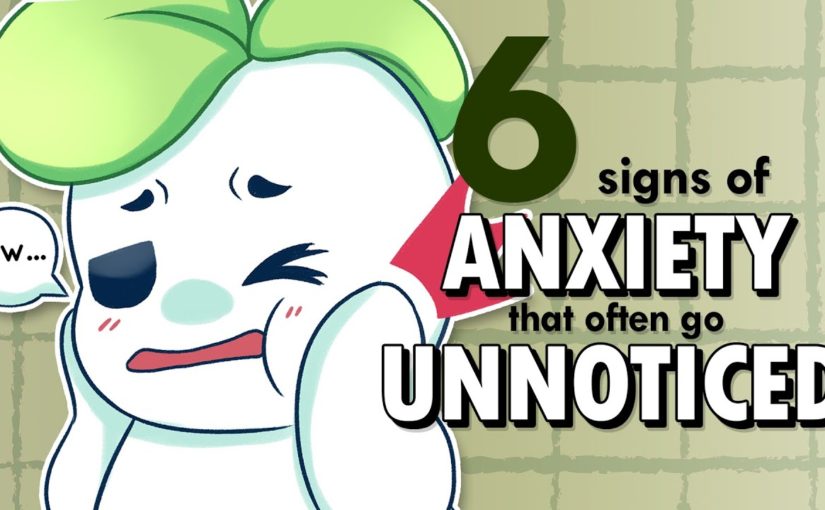
 Adrenaline helps you
redirect your blood flow so that most of it is sent
to your vital organs, like your heart and lungs. Consequently, your extremities
start to feel cold. Number four is irritability. Do you easily become irritated? Irritability is a common sign of anxiety. However, it’s a symptom we
often overlook or ignore. It’s a sign that you’re
overwhelmed with stress. Anxiety is associated
with hypersensitivity, meaning that you’ll be much more sensitive to your surroundings, which may cause you to feel
more irritated than usual. Number five is impulsive buying. Another sign of anxiety is impulsivity. In this case, impulse buying. However, impulsivity can manifest itself in many ways, such
as engaging in risky behavior. Impulsivity because of anxiety can be due to numerous factors. The main one is that your
orbital frontal cortex, another branch of your
limbic system, is affected. Studies found that anxiety
increases the blood flow to that region, which
consequently, increases activity. An increase in activity can lead to either impulse control issues,
hoarding, or impulse spending. Additionally, anxiety affects
your prefrontal cortex and makes it harder for you to make wise and thoughtful decisions. Impulse buying, as well as hoarding, are also forms of self-soothing. They provide a false sense
of comfort and security. If you do find yourself caving in and taking financial risks, please consider reaching
out to a therapist for help. And number six, crying easily. When was the last time you cried? One last sign that goes
unnoticed is crying easily. Inexplicably bouts of crying can mean you’re overwhelmed by the
situation you find yourself in. Not only can it be because
of a sensitivity to stress, but it can also be due to
your fight or flight response. The correct terminology is
fight, flight, or freeze. Feeling stuck or freezing
amidst a perceived threat can progress these overwhelming
feelings of stress. When you find yourself crying, attempt to relax by taking a deep breath. Then allow yourself to cry. Crying can release all of those feelings you may be holding onto. It may be great to find
additional ways to self-soothe when you’re feeling anxious as well. So have you experienced
any of these signs? I have. What are some self-soothing
behaviors that help you? I enjoy walking. Feel free to let us know
in the comments below. Anxiety is quite common
and can be manageable. If you ever need help or guidance reaching out to a therapist
or mental health professional can be a good idea. Feel free to like and share
this video if it helped you, or if you think it
could help someone else. Don’t forget to hit the subscribe button and notification bell icon
for more videos like this. And thanks for reading, take care.
Adrenaline helps you
redirect your blood flow so that most of it is sent
to your vital organs, like your heart and lungs. Consequently, your extremities
start to feel cold. Number four is irritability. Do you easily become irritated? Irritability is a common sign of anxiety. However, it’s a symptom we
often overlook or ignore. It’s a sign that you’re
overwhelmed with stress. Anxiety is associated
with hypersensitivity, meaning that you’ll be much more sensitive to your surroundings, which may cause you to feel
more irritated than usual. Number five is impulsive buying. Another sign of anxiety is impulsivity. In this case, impulse buying. However, impulsivity can manifest itself in many ways, such
as engaging in risky behavior. Impulsivity because of anxiety can be due to numerous factors. The main one is that your
orbital frontal cortex, another branch of your
limbic system, is affected. Studies found that anxiety
increases the blood flow to that region, which
consequently, increases activity. An increase in activity can lead to either impulse control issues,
hoarding, or impulse spending. Additionally, anxiety affects
your prefrontal cortex and makes it harder for you to make wise and thoughtful decisions. Impulse buying, as well as hoarding, are also forms of self-soothing. They provide a false sense
of comfort and security. If you do find yourself caving in and taking financial risks, please consider reaching
out to a therapist for help. And number six, crying easily. When was the last time you cried? One last sign that goes
unnoticed is crying easily. Inexplicably bouts of crying can mean you’re overwhelmed by the
situation you find yourself in. Not only can it be because
of a sensitivity to stress, but it can also be due to
your fight or flight response. The correct terminology is
fight, flight, or freeze. Feeling stuck or freezing
amidst a perceived threat can progress these overwhelming
feelings of stress. When you find yourself crying, attempt to relax by taking a deep breath. Then allow yourself to cry. Crying can release all of those feelings you may be holding onto. It may be great to find
additional ways to self-soothe when you’re feeling anxious as well. So have you experienced
any of these signs? I have. What are some self-soothing
behaviors that help you? I enjoy walking. Feel free to let us know
in the comments below. Anxiety is quite common
and can be manageable. If you ever need help or guidance reaching out to a therapist
or mental health professional can be a good idea. Feel free to like and share
this video if it helped you, or if you think it
could help someone else. Don’t forget to hit the subscribe button and notification bell icon
for more videos like this. And thanks for reading, take care.